The impact of automation (AI and robotics) on UK workers has been assessed by accountancy firm PwC.
According to the report, almost one third of UK jobs by the 2030s could be affected by advances in automation, compared with 38% in the US, 35% in Germany and 21% in Japan.
In an interview with the BBC, John Hawksworth, chief economist at PwC, said that the jobs most at risk are those that are “more manual, routine jobs” which “can effectively be programmed.”
“Jobs where you’ve got more of a human touch, like health and education,” would be less affected, he said.
The sectors at highest risk to automation include transportation and storage (56%), manufacturing (46%) and wholesale and retail (44%), while sectors like health and social work are at a much lower risk (17%), according to the report.
“In practice, not all of these jobs may actually be automated for a variety of economic, legal and regulatory reasons,” the firm says.
Adding that new automation technologies “will both create some totally new jobs in the digital technology area and, through productivity gains, generate additional wealth and spending that will support additional jobs of existing kinds, primarily in services sectors that are less easy to automate.”
On average, the report expects that a higher proportion of male jobs (35%), particularly those of men with lower levels of education, are at higher potential risk of automation than female jobs (26%).

Whilst the report notes that AI-related technologies will help boost productivity and generate additional jobs elsewhere in the economy, it also explored the impact automation could have on income inequality. The report says that higher automation related to AI and robotics could widen income inequality as a “greater proportion of the economic pie” will go to people with the knowledge and skills to “thrive in an ever more digital economy”.
John Hawksworth, chief economist at PwC, commented:
“A key driver of our industry-level estimates is the fact that manual and routine tasks are more susceptible to automation, while social skills are relatively less automatable. That said, no industry is entirely immune from future advances in robotics and AI.
“Automating more manual and repetitive tasks will eliminate some existing jobs, but could also enable some workers to focus on higher value, more rewarding and creative work, removing the monotony from our day jobs.
“By boosting productivity – a key UK weakness over the past decade – and so generating wealth, advances in robotics and AI should also create additional jobs in less automatable parts of the economy as this extra wealth is spent or invested.
“The UK employment rate is at its highest level now since comparable records began in 1971, despite all the advances in digital and other labour-saving technologies we have seen since. It is not clear that the future will be radically different from the past in terms of how automation will affect overall UK employment rates.”
Jon Andrews, the head of technology and investments at PwC, said:
“There’s no doubt that AI and robotics will rebalance what jobs look like in the future, and that some are more susceptible than others.
“What’s important is making sure that the potential gains from automation are shared more widely across society and no one gets left behind. Responsible employers need to ensure they encourage flexibility and adaptability in their people so we are all ready for the change.
“In the future, knowledge will be a commodity so we need to shift our thinking on how we skill and upskill future generations. Creative and critical thinking will be highly valued, as will emotional intelligence.”
